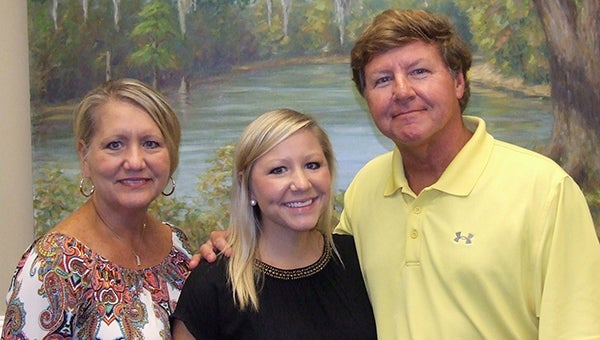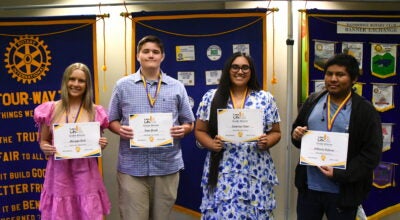Cancer research keeps local youth alive, provides hope
Published 8:20 pm Tuesday, September 16, 2014

Christy and Steve Poitevint surround their daughter Jordan, who is surviving chronic myeloid leukaemia. — Carolyn Iamon
Jordan Poitevint had just entered her first year at Auburn University when she was diagnosed with Chronic Myeloid Leukaemia (CML) two days after her 20th birthday—hardly the gift one wants to receive.
She had been experiencing unexplained weight loss, feeling tired, bruising easily and bleeding when her parents insisted she go get blood work done. The medical people at Auburn came back with the report and the word no one wants to hear. They also didn’t give a very positive outlook. They told her parents to get her to a teaching hospital as soon as possible.
They chose to go to Winship Cancer Institute at Emory University where Jordan was placed under the care of Dr. Hannah Khoury. There they received a slightly better prognosis than originally thought.
Jordan dropped out of Auburn for one semester and traveled to Atlanta weekly for two months until her blood levels stabilized. Then for several years, every three months she had to have a bone marrow biopsy—a very painful experience. Thankfully, due to her continued state of remission, and improved treatment protocol, that is no longer necessary.
She managed to return to college in January of the next year and participated in normal school activities, such as sorority, working part-time and being a Tigerette. She graduated with a degree in communications
Now, seven years later, she returns every six months for a check up. She also continues to take a chemo pill daily to help maintain remission of her illness.
The family was told at their January 2014 checkup that new clinical trials are being conducted for a new medication that can help patients boost their resistance. Research is continuing in that field, but that treatment has not yet been approved. Jordan said she would like to see continued research so that she wouldn’t have to keep taking the daily medicine she now takes. That pill she takes daily keeps her in remission, but is not a cure. The only cure currently known would be a bone marrow transplant, described as being very risky.
Meanwhile, Jordan lives a full life. She is currently employed as a representative of McKesson Medical and Surgical, selling medical supplies to nursing homes in Georgia and Florida—a job that keeps her constantly on the road.
As is so often the case, it is what youth are exposed to in life that predicts or facilitates their career decisions. Jordan confirms that she has known for some time that she wanted to be employed in the medical field
Her parents, Steve and Christy Poitevint, support helping CURE to fund research and find a cure for cancer in children. The treatment cost is astronomically expensive. Steve explains that little pill taken daily costs thousands each month. He said the research and development of new medication costs the pharmaceutical companies billions of dollars.
Asked what part continuing research has played in Jordan’s illness and life, Steve emphatically responded, “Because of it she’s alive today. 40 years ago it was almost a death sentence.” He adds that a positive attitude is also key. “She had to learn at an early age what was really important.”
Jordan agrees, saying “You can never take a single day for granted. That’s for sure. I still get very tired; but I don’t let it get me down.”
Editor’s Note: This is the second in a series of articles about September being the month dedicated to finding a CURE for cancer in children.





